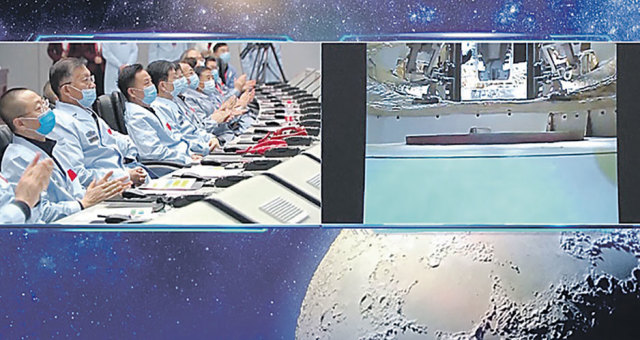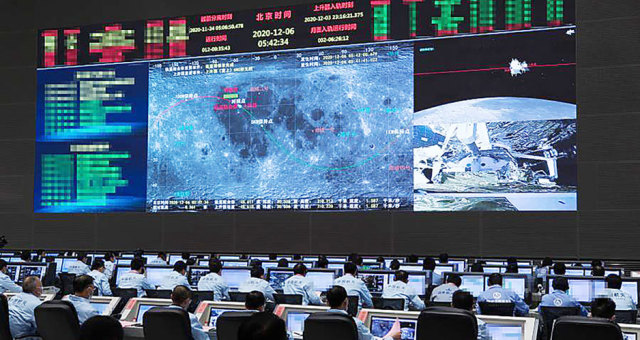The US is preparing, Russia is fantasizing, China is flying
On the first day of December, the Chinese Chang'e-5 spacecraft made a soft landing on the surface of the moon. After the lunar landing, he began collecting samples of lunar soil. At the moment, the samples have already been collected and the take-off module has successfully put them into lunar orbit.
Chinese jerk
Of course, the mission to deliver and study lunar regolith samples is a landmark event in itself. However, it should be borne in mind that this is the third successful landing of the Chinese automatic device on the surface of the Earth's satellite. This enviable consistency suggests that China is gradually developing technologies for the upcoming manned flights to the moon of its taikonauts.
While the us NASA is making plans for the development of the moon's resources and signing contracts with partners in the framework of its Artemis program, and Russia is generally limited to near-moon conversations, China is step by step storming space peaks one after another. Having started its space journey with the launch of the first simple satellite in 1970, today China has become the third power in the world with manned spaceflight and the ability to carry out complex scientific missions in outer space. In the near future, we plan to create our own orbital station, the base unit of which should be launched next year. It will be a kind of a La OKS "Mir" in Chinese performance. Following the logic and ambitions of the celestial Empire, which the Chinese do not particularly hide, the station must inevitably be followed by lunar manned expeditions. They have already successfully tested a new ship for this purpose in the first space flight.
However, to implement the lunar project, they will have to solve several more complex technical problems. First of all, build a super-heavy launch vehicle "Changzheng-9". Unlike the United States and the Soviet Union, the Chinese have not yet created something like this. But let's remember the recent experience of how they created their heavy carrier "Changzheng-5". They did some things themselves, but they simply stole some technologies, because China's scientific and technical intelligence works extremely effectively. Others bought on the cheap, in particular, in Ukraine, they were purchased literally for pennies of the production technology of the RD-120 LRE, developed, by the way, by a Russian enterprise. The engine was not the first freshness,but the Chinese were satisfied with it. Probably, they are planning to do something similar with superheavy and, judging by the positive trends, they should succeed.
And we're stalling
Against the background of the unprecedented dynamics of the Chinese space program and the traditional success of US scientific projects in space, Russian achievements have noticeably faded. Of the extreme launches, perhaps only the work of the Spektr-RG scientific apparatus can be noted. On this occasion, I immediately recall the words of Boris Berezovsky, said in the London emigration: "Money was, money will be, now there is no money." By analogy with the above, we also had space achievements (we remember) and probably will (we firmly believe in this), but today there is not much to brag about.
Yes, Soyuz spacecraft fly to the ISS routinely and almost without failures, Space troops launch with the same reliability, and target satellites work in orbit, but revolutionary projects have not been observed for a long time. We know that they still exist, and we can only hope and wait for them to be systematically implemented. The fate of future achievements to a greater extent, oddly enough, depends not on the competence of employees of space enterprises, but on the financial component. Money will be allocated and new projects will be launched, of which there are a lot of them, and they have a very different orientation.

Photo: bigasia.ru
Alexander Sergeev, President of the Russian Academy of Sciences, recently spoke at a meeting of the state Duma Committee on education and science. He clearly stated that due to underfunding, we will not be able to compete in space with other powers. And it will be a space science disaster. "This year, the funding for scientific space that is available in Russia is 60 times less than the funding for scientific space in NASA," he said.
In such circumstances, it seems reasonable to replicate the experience of creating the Spektr-RG SPACECRAFT, which was created jointly by Russia and Germany. The benefits of this approach, as they say, are obvious: money - in the fold,and scientific discoveries – General. And the more countries take part in a particular project, the more profitable it is for everyone. This is also understood in the United States, which is pulling as many participating countries as possible into its lunar project.
Shall we go together?"
What can Russia do in this situation? It should be noted that there are not many options, but the real one is to explore the moon together with China. Moreover, China has officially invited other countries to take part in this project, making an unambiguous hint first of all to its Northern neighbor. Cooperation between our countries in the field of manned space exploration is facilitated by the fact that both Chinese and Russian equipment is largely based on time-tested Soviet technologies. If Russia inherited them, as they say, they were the Foundation of the Chinese space program, and it is only thanks to them that the program is developing so rapidly today.
If the case is set up correctly, Russia will by and large have something to go into the lunar project with. If stable funding is provided, then by the beginning of the 2030s, when a manned expedition with a landing on the surface of the moon becomes a reality, Russian cosmonautics will clearly not come up empty-handed. The new Orel spacecraft, which is being actively created at RSC Energia after long delays, will already be fully developed. An energy module under construction for the Russian segment of the ISS may be included in the series. Such modules can be useful both for the future Russian orbital station, which will replace the aging ISS, and for the planned station in lunar orbit. By that time needs to be completed flight testing of a new line of boosters, especially "Soyuz-5", "Angara-5M" and "Angara-5", and initiated the first flights of the super-heavy rocket "Yenisei", and then the PH "don."
It may even begin flight tests of a nuclear tug-a transport module with a megawatt-class nuclear installation, which the im Center is responsible for creating. Keldysh's. This product is worth focusing on. It is the nuclear tug that will make it cost-effective to fly between earth and lunar orbits and back. Apparently, Russia is about a decade ahead of its competitors here, and the main thing here is not to slow down. If everything goes well, Russia will get huge opportunities both for moving payloads between orbits (which will give huge savings), and for flights to deep space. And in this regard, we will be out of competition for a very, very long time.
A few years ago, Elon Musk made a bet on reusable launch VEHICLES and did not lose, effectively monopolizing commercial launches of heavy spacecraft. Having a monopoly, today it removes all the cream from this market segment. By and large, it is profitable to be a monopolist: just remember the delivery of American astronauts to the ISS using the Russian Soyuz spacecraft. After the tragic accident of the American Columbia, the Americans simply had nothing to fly in space and they had to buy seats on our Soyuz spacecraft, because there were simply no other options. For seventeen years, NASA was forced to pay Roscosmos for this service, spending almost four billion dollars. In other words, Russia earned this money thanks to its monopoly on manned flights. Therefore, by creating a nuclear tug, Roscosmos will be able to become a monopoly again and repeat Musk's success at a new technological turn.
I also really want to believe that in a dozen years the long-suffering production of elements for space technology will finally be mastered, without which it is impossible to move forward. One cannot indefinitely depend on foreign suppliers for key electronic components for its satellites.
In General, Russia has every chance to approach the turn of 2030 in the full sense of the word fully armed. If the Ministry of Finance does not fail.
Vladimir Volgin
Military-industrial courier newspaper, published in issue # 47 (860) for December 8, 2020

